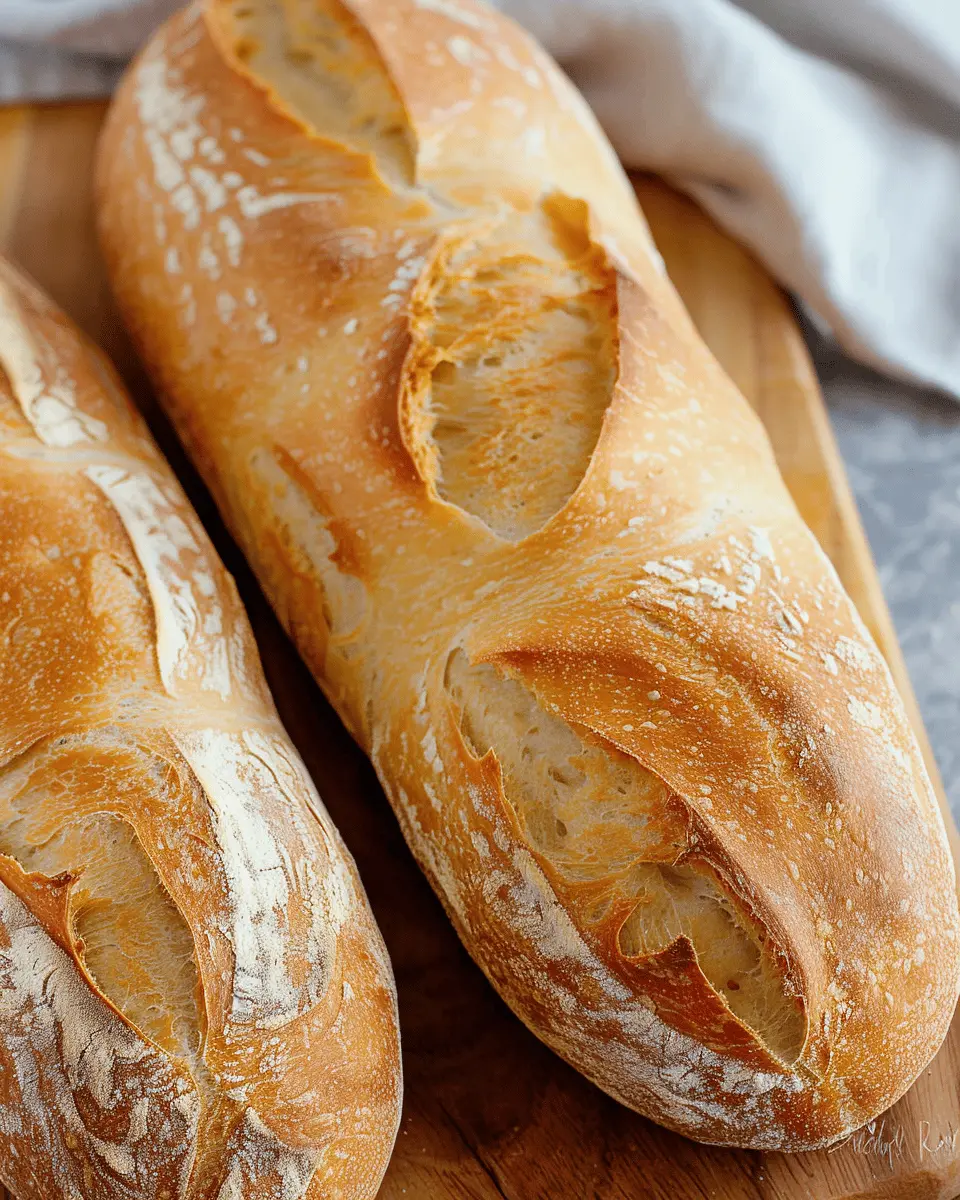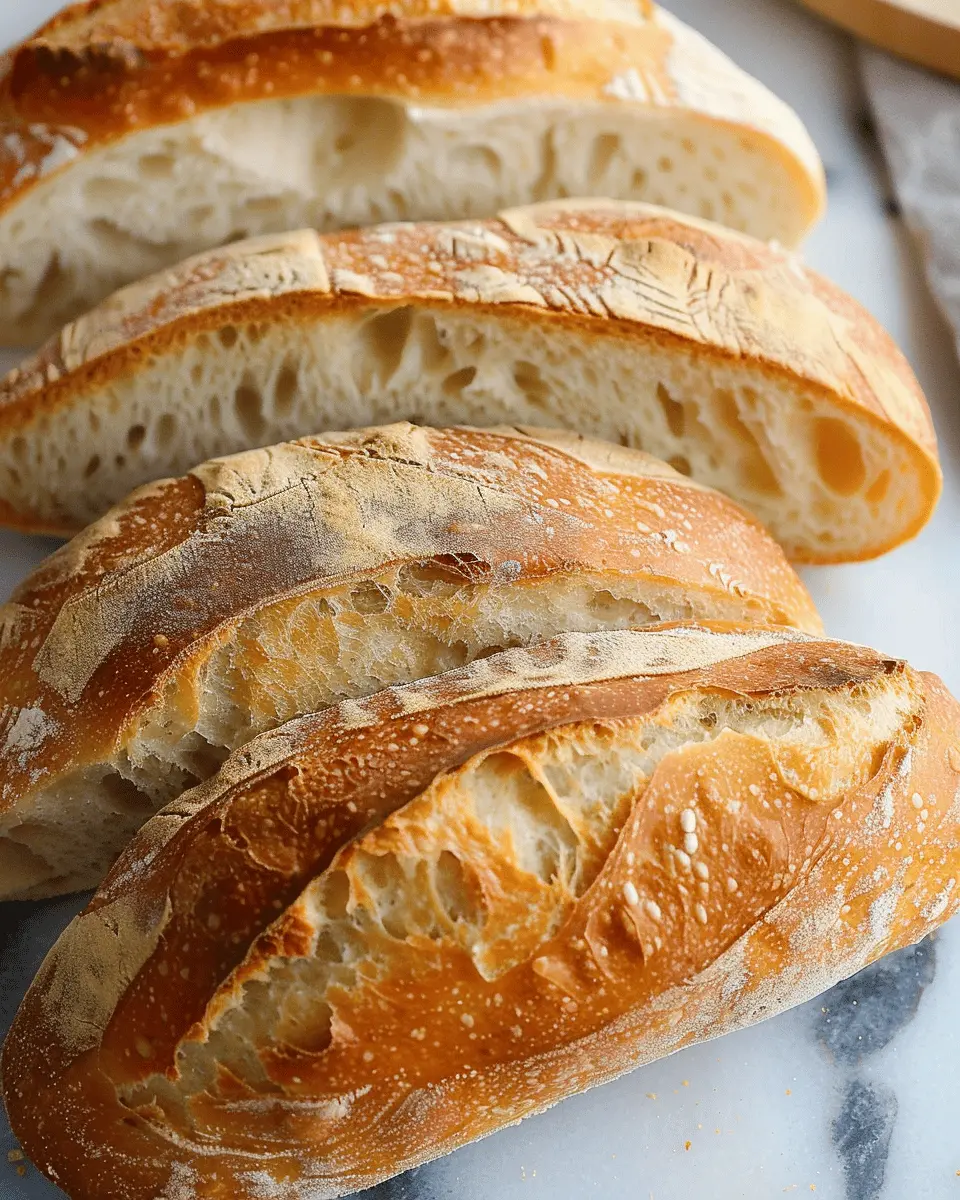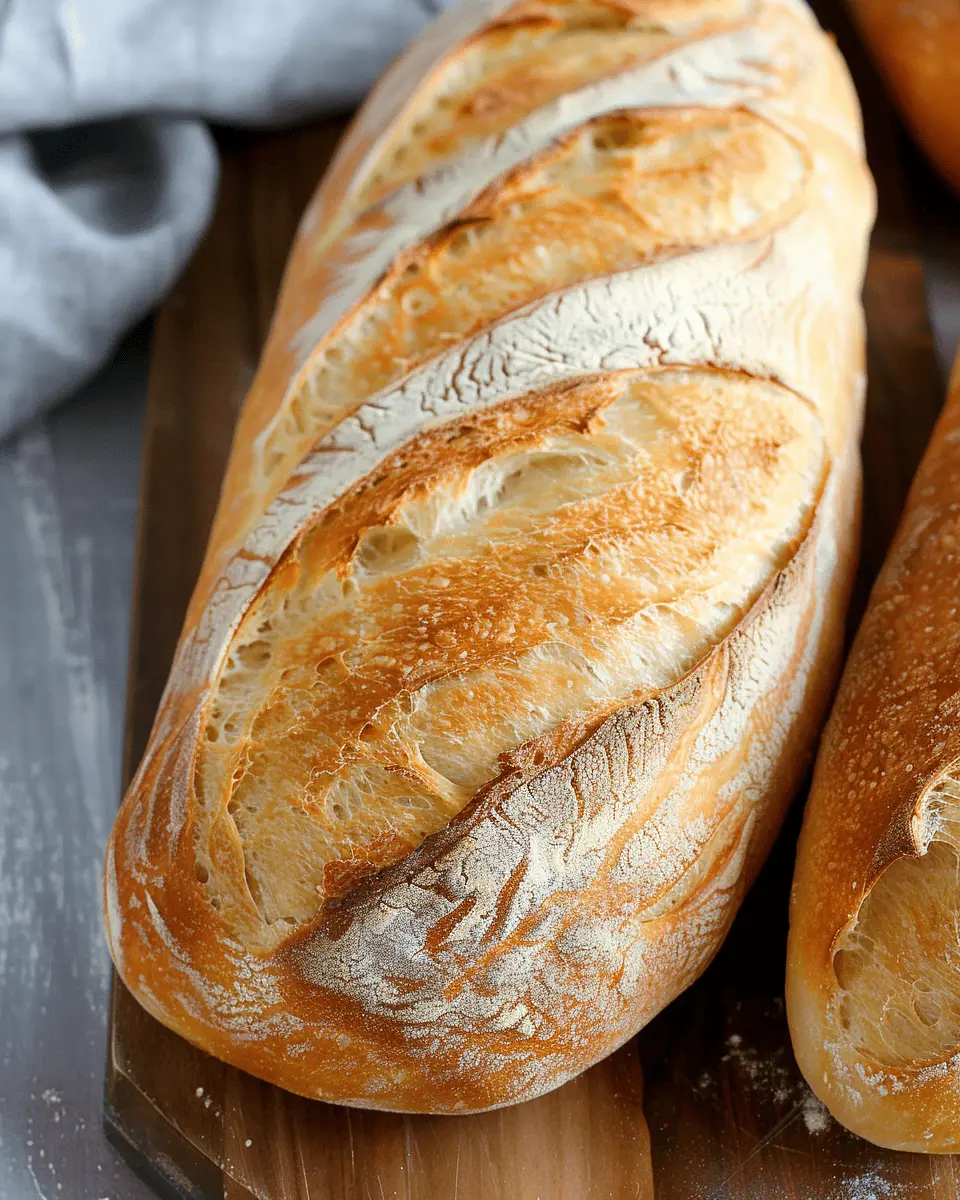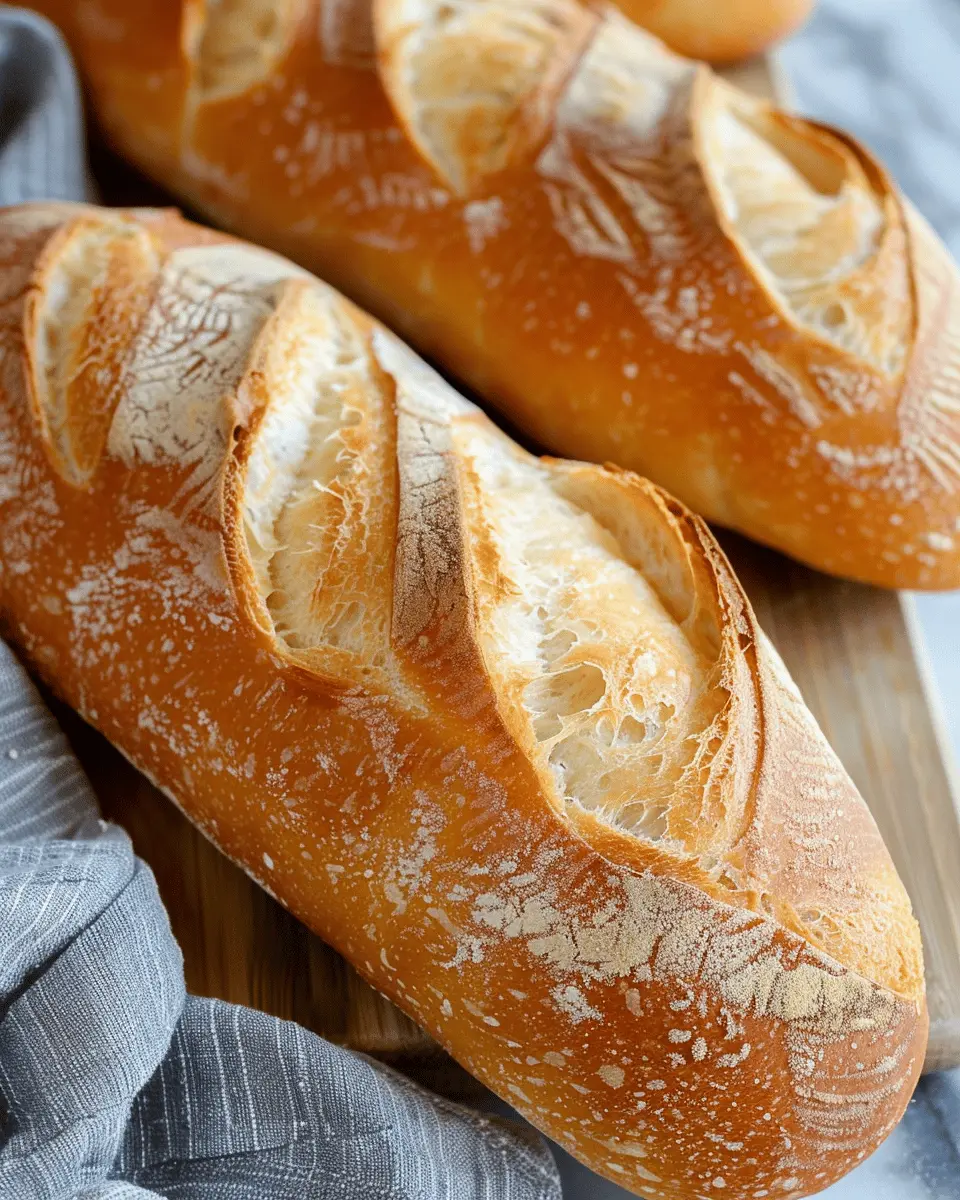Introduction to Soft Sourdough French Bread
When it comes to comfort foods that feel special yet effortless, soft sourdough French bread deserves a top spot on your list. The allure of this bread lies not just in its delightful texture and flavor but also in the unique fermentation process that supports gut health and adds a complexity to the taste. If you’ve ever munched on a warm, crusty piece with a soft, fluffy interior, you know exactly what I mean.
Why Choose Soft Sourdough French Bread?
-
Health Benefits: One of the biggest perks of sourdough is its probiotic properties, resulting from natural fermentation. This can aid digestion and even help regulate blood sugar levels. Plus, it’s often easier to digest than regular bread due to lower gluten levels. Curious about the science? Check out this Harvard study that dives into sourdough’s impact on health.
-
Flavor Profiles: What makes soft sourdough French bread stand out is its subtly tangy flavor, which can elevate any meal. It’s perfect for everything from serving alongside a bowl of hearty soup to being the star of your brunch spread with a selection of spreads or toppings.
-
Versatility: This type of bread is incredibly adaptable. You could turn it into delectable sandwiches filled with Turkey Bacon and Chicken Ham, or simply enjoy a slice with a pat of butter and a sprinkle of sea salt. In fact, the possibilities are endless—think about making French toast or croutons for your salads!
-
Baking Experience: Engaging in the art of bread-making can be therapeutic. Kneading dough, watching it rise, and smelling that heavenly aroma waft through your kitchen is nothing short of rewarding. It invites you to slow down and embrace the process, making it as much about the journey as the destination.
If you’re ready to craft your very own loaf of soft sourdough French bread, you’re in for a delightful experience. Not only will your taste buds thank you, but your kitchen will be filled with warmth and the scent of homemade goodness. So, grab your ingredients, and let’s get kneading!

Ingredients for Soft Sourdough French Bread
Creating the perfect soft sourdough French bread is not just about following a recipe—it’s about selecting the right ingredients that work harmoniously together. Here’s what you’ll need for this delightful bread:
-
Sourdough Starter: Start with an active and bubbly sourdough starter that will impart that essential tangy flavor. You can easily make your own or buy one from a reputable source like King Arthur Baking.
-
Bread Flour: High-protein bread flour is crucial for developing that chewy texture we all love. It provides structure and strength to your loaf.
-
Water: Use warm water to help awaken your sourdough starter and mix it thoroughly with the flour. Filtered or bottled water can yield better results.
-
Salt: A must-have for flavor, but don’t go overboard! About 2% salt to flour ratio works wonders.
-
Optional Ingredients: You might want to add a touch of honey or malt for a hint of sweetness and to enhance the crust’s color.
With these simple yet effective ingredients, you’re well on your way to baking soft sourdough French bread that rivals the finest bakeries. Are you ready to dive in?
Preparing Soft Sourdough French Bread
Baking soft sourdough French bread might seem like an art reserved for experienced bakers, but it’s truly a rewarding process that anyone can master with a little patience and practice. This guide will take you step-by-step through the journey of transforming simple ingredients into delicious, crusty loaves that are perfect for sandwiches or as a side to your favorite meals.
Making the Levain
To kick things off, we need to build our levain, which acts as the sourdough starter for our bread. Think of it as the magical potion that gives your bread that delightful tang!
- Ingredients: Combine equal parts of water and flour (50g each) with a spoonful of your mature sourdough starter in a bowl.
- Rest: Let this mix sit at room temperature for about 4 to 6 hours, until it’s bubbly and puffy. If you want more guidance on starting a sourdough starter, I recommend checking out King Arthur Baking for their excellent resources.
Mixing the Dough
Once your levain is ready, it’s time to introduce it to the rest of our ingredients.
- Combine: In a large mixing bowl, mix 500g of all-purpose flour, 350g of water, and 10g of salt.
- Add Levain: Gently fold in your prepared levain. It can be tempting to whisk or beat the mixture, but you want to be gentle here; this preserves the air bubbles that will give your bread its lovely texture.
This step can set the foundation for a lovely, soft crumb, so take your time.
Bulk Fermentation
Now comes the patience-testing part — the bulk fermentation. This is when the magic happens!
- Cover the Dough: Let your dough rest in a warm place (ideally around 75°F/24°C) for 4 to 6 hours.
- Stretch and Fold: Every 30 minutes during the first 2 hours, give the dough a quick stretch and fold. Just grab one edge of the dough, stretch it up, and fold it over to the center. Rotate, and repeat until you’ve done this for each side.
This technique helps develop the gluten structure, contributing to that delightful chewy texture we’re striving for in our soft sourdough French bread.
Shaping the Loaves
After your dough has bulked up, it’s time to shape it into loaves.
- Divide the Dough: Gently turn your dough out onto a lightly floured surface. Divide it into two pieces (or more, depending on your preference).
- Pre-shape: Lightly shape each piece into a ball. Allow it to rest for about 20 minutes.
- Final Shape: After resting, shape each piece into a final loaf. You can tuck in the sides and roll them up to form a batard (a football-shaped loaf) or keep it simple with a round shape.
Proofing the Dough
Once shaped, it’s time to let it proof.
- Rest Time: Place the loaves in a proofing basket, seam side up, and cover with a towel. Let them rest for another 1.5 to 2 hours at room temperature or in the fridge overnight for improved flavor.
Patience pays off here. The longer they proof, the better the flavor and texture!
Scoring and Baking
Finally, the moment of truth has arrived — scoring and baking your soft sourdough French bread!
- Preheat: Preheat your oven to 475°F (245°C) with a baking stone or Dutch oven inside to create that perfect crispy crust.
- Score: Using a sharp knife or lame, carefully score the top of each loaf. This allows steam to escape during baking and gives an artisanal look.
- Bake: Carefully transfer your loaves to the oven. Bake for about 25 to 30 minutes, or until they’re golden brown and sound hollow when tapped on the bottom.
Once baked, let the loaves cool on a rack for at least an hour before slicing. It’s hard to resist the aroma, but trust me, waiting is worth it!
With this guide, you’re well on your way to mastering soft sourdough French bread. Enjoy the process, and happy baking!

Variations on Soft Sourdough French Bread
When you’ve mastered the art of soft sourdough French bread, it’s time to experiment with some delightful variations that will charm your family and guests. Let’s explore two unique recipes that add a flavorful twist to your classic loaf.
Herb and Garlic Sourdough Bread
Imagine biting into soft sourdough where the aroma of fresh herbs and roasted garlic wraps around you. This variation not only elevates the taste but also brings a burst of color to your breadbasket. To create this savory delight:
- Ingredients: In your basic soft sourdough French bread recipe, simply add 2 tablespoons of finely chopped fresh herbs (like rosemary, thyme, or basil) and 3-4 cloves of roasted garlic, mashed.
- Instructions: Incorporate these with your dough during the mixing stage. Not only will your kitchen smell divine, but these flavors will infuse your bread throughout the kneading process.
You might enjoy this link to explore more about the health benefits of herbs here.
Sweet Sourdough French Bread with Cinnamon
For a delightful change that’s perfect for breakfast or dessert, try making a sweet version of your soft sourdough French bread. The warm notes of cinnamon can transform any meal into a special occasion. Here’s how:
- Ingredients: Just add ½ cup of sugar and 2 teaspoons of ground cinnamon to your dough ingredients. For an extra touch, consider folding in 1 cup of raisins or dried cranberries.
- Instructions: Mix the sugar and cinnamon with your flour before combining it with water and your starter. You’ve now got a sweet treat that pairs exquisitely with butter or cream cheese.
Imagine sipping your morning coffee paired with this fragrant bake—who could resist? For more on baking with spices, check out this fantastic resource here.
Whichever variation you choose, these spins on soft sourdough French bread are sure to impress! Enjoy your baking adventure, and don’t hesitate to share your experiences!
Baking Notes for Soft Sourdough French Bread
Common Mistakes to Avoid
Baking soft sourdough French bread can be a delightful experience, but there are a few common pitfalls to watch out for:
-
Over-proofing: This is when your dough rises too much. It leads to a flat loaf that lacks structure. Keep an eye on your dough, and don’t rely solely on the clock. Instead, look for that slight increase in size and a puffy appearance.
-
Under-hydration: Not using enough water can lead to dense and tough bread. Flour absorbs moisture differently, so it’s essential to be flexible with your water amounts based on the flour you’re using.
To dive deeper into common mistakes in sourdough baking, check out this helpful article on sourdough basics.
Tips for Perfect Texture
For that ideal soft sourdough French bread texture, consider these tips:
-
Use a Kitchen Scale: Measuring your ingredients by weight rather than volume leads to greater accuracy and consistency.
-
Stretch and Fold Technique: Instead of kneading, try this method for stronger gluten development. This gentle stretching allows air into the dough, enhancing its texture.
-
Bake with Steam: Introducing steam during the first part of baking can create a beautiful crust while keeping the inside soft. Place a metal pan in the oven to fill with water or use a spray bottle for a quick mist.
With these notes, you’re well on your way to mastering the art of soft sourdough French bread. Happy baking!

Serving Suggestions for Soft Sourdough French Bread
Perfect Pairings for Meals
If you’re looking for flavorful ways to enjoy your soft sourdough French bread, consider pairing it with your favorite meals. Its tender texture complements various dishes perfectly. Try it alongside hearty soups, such as a classic tomato basil or a rich beef stew, letting the bread soak up each delicious drop.
For a lighter option, serve slices of this bread with a fresh avocado and a sprinkle of sea salt. If you’re in the mood for something indulgent, spread some turkey bacon and fresh heirloom tomatoes on a piece—delightful! Don’t forget to include a side of homemade garlic butter for dipping.
Creative Uses for Leftovers
What to do when you’ve got extra soft sourdough French bread hanging around? Rather than letting it go stale, get creative!
- French Toast: Whip up a batch of delightful French toast for brunch by dipping slices in a mixture of eggs, milk, and cinnamon before grilling.
- Croutons: Turn stale bread into crispy croutons. Simply cube the bread, toss in olive oil and seasonings, then bake until golden.
- Panini: Make an irresistible panini featuring chicken ham, fresh greens, and your choice of cheese.
For more ideas, check out this comprehensive guide to bread recipes. It’s a fantastic resource for transforming leftovers into culinary delights!
Essential Tips for Making Perfect Soft Sourdough French Bread
Monitoring Dough Temperature
One of the most important factors in baking soft sourdough French bread is the dough temperature. Ideally, your dough should be between 75°F and 80°F (24°C to 27°C) during fermentation. This range allows the wild yeast and bacteria to thrive, resulting in that delightful tang and airy texture. To achieve this, consider using a thermometer to check the temperature of both your ingredients and the dough as it ferments. You might also want to experiment by pre-fermenting at different temperatures—some bakers find warmer temperatures yield a more pronounced flavor, while cooler temps provide a milder, more subtle taste. For more tips on dough handling temperatures, check out King Arthur Baking’s guidelines.
Timing and Patience
Patience is key when making soft sourdough French bread. While it can be tempting to rush through the process, allowing for longer fermentation times can enhance flavor and texture. Plan for multiple risings, each lasting anywhere from 30 minutes to several hours. This not only develops complex flavors but also improves the dough’s structure, resulting in that soft, chewy crumb we all crave. If you find yourself looking for the perfect timing, don’t hesitate to use a timer or your favorite baking app to keep track. Remember, great things take time—baking included!
Time Breakdown for Soft Sourdough French Bread
When you’re craving soft sourdough French bread, knowing how much time you’ll need can really help streamline your baking experience. Let’s break it down!
Preparation Time
Making this delightful bread will take you approximately 30 minutes. This includes mixing your ingredients and kneading the dough to achieve that perfect texture. Don’t rush! Enjoy the process, and feel free to dance around your kitchen while you do it.
Baking Time
Once your bread is shaped and ready, it’ll take about 30 to 35 minutes in the oven. Keep an eye on it so you can catch that gorgeous golden color right as it emerges.
Total Time
Overall, you’re looking at around 4 to 5 hours to enjoy your soft sourdough French bread. Most of this time is dedicated to the rise, which is crucial for developing those delightful flavors. Use this downtime to whip up some spreads or maybe try your hand at making a homemade turkey bacon sandwich!
Experimenting with sourdough bread can be a fantastic hobby. If you want to dive deeper, check out The Art of Sourdough for more tips and tricks. Happy baking!
Nutritional Information for Soft Sourdough French Bread
When you’re enjoying a slice of soft sourdough French bread, it’s helpful to know what you’re fueling your body with. Here’s a quick breakdown of the nutritional content, which can assist you in balancing your diet.
Calories
One slice of soft sourdough French bread typically contains about 80-100 calories. This makes it a satisfying addition to your meals without overwhelming your daily intake.
Macronutrient Breakdown
- Carbohydrates: Approximately 15-20g per slice, providing a quick source of energy.
- Proteins: Around 3g, contributing to muscle repair and vital functions.
- Fats: Very low, at about 1g or less, depending on the recipe.
For a deeper understanding of how bread fits into a balanced diet, check out the U.S. Department of Agriculture (USDA) for reliable resources and guidelines. Remember, moderation is key! Enjoy your soft sourdough French bread in a way that complements your lifestyle.
FAQs about Soft Sourdough French Bread
How can I ensure my sourdough bread rises well?
To achieve that perfect rise in your soft sourdough French bread, make sure your starter is active and bubbly before you begin. Take a moment to feed it at least 4-6 hours in advance or even overnight. The temperature of your ingredients plays a significant role, too—when in doubt, aim for warm (not hot) water and a cozy room temperature for your dough to ferment properly. Using a warming drawer or the “proof” setting on your oven can help create an ideal environment.
What can I use instead of bread flour?
If you don’t have bread flour on hand, don’t worry! You can substitute with all-purpose flour; however, the texture may differ slightly due to lower gluten content. To enhance the structure of your soft sourdough French bread, try mixing in vital wheat gluten (about 1 tablespoon per cup of all-purpose flour) to help with that chewy, satisfying crust.
Can I prepare the dough in advance?
Absolutely! Preparing your dough in advance is not only convenient but often improves flavor. After mixing, let the dough rise until doubled, then shape it and place it in the fridge overnight. This slow fermentation allows the flavors to develop beautifully. Just remember to give it time to come back to room temperature before baking. For more tips on bread-making techniques, check out resources like the King Arthur Baking Company.
With these answers, you’re on your way to mastering the art of soft sourdough French bread! Happy baking!
Conclusion on Soft Sourdough French Bread
Crafting soft sourdough French bread can be an incredibly rewarding experience. Not only does it fill your home with an irresistible aroma, but it also offers a unique flavor profile that store-bought loaves simply can’t match. If you’re seeking a versatile bread, this recipe is a fantastic foundation for delicious sandwiches or simply enjoying with a bit of butter.
- Perfect Pairings: Enjoy your fresh bread with turkey bacon, chicken ham, or even as a base for a delightful brunch spread.
- Experiment and Enjoy: Don’t hesitate to try different toppings or spreads. Want a sweet twist? Homemade jams can elevate your experience.
Remember, baking is as much about joy as it is about technique; so find your rhythm and indulge in the process! For more inspiration, check out resources from King Arthur Baking or Food52 for endless ideas to accompany your soft sourdough French bread.
Print
Soft Sourdough French Bread: The Best Homemade Recipe Yet
Discover the secrets to mastering soft sourdough French bread with this homemade recipe that yields a deliciously crusty exterior and a soft, airy interior.
- Total Time: 6 hours 15 minutes
- Yield: 1 loaf 1x
Ingredients
- 500 grams all-purpose flour
- 350 ml water
- 100 grams sourdough starter
- 10 grams salt
Instructions
- In a large bowl, mix together the flour, water, and sourdough starter until combined.
- Let the dough rest for 30 minutes, then add the salt and mix well.
- Knead the dough for about 10 minutes until smooth and elastic.
- Let the dough rise in a warm place until doubled in size, about 4 to 6 hours.
- Shape the dough into a loaf and place it into a floured banneton.
- Cover and let rise for another 2 hours.
- Preheat the oven to 450°F (232°C) with a Dutch oven inside.
- Carefully transfer the dough into the hot Dutch oven, cover, and bake for 30 minutes.
- Remove the lid and bake for an additional 15 minutes until golden brown.
- Let cool before slicing.
Notes
- Use a kitchen scale for precise measurements.
- Experiment with different types of flour for varied flavors.
- Prep Time: 30 minutes
- Cook Time: 45 minutes
- Category: Bread
- Method: Baking
- Cuisine: French
- Diet: Vegetarian
Nutrition
- Serving Size: 1 slice
- Calories: 150
- Sugar: 0.5 grams
- Sodium: 200 milligrams
- Fat: 1 gram
- Saturated Fat: 0 grams
- Unsaturated Fat: 0.5 grams
- Trans Fat: 0 grams
- Carbohydrates: 30 grams
- Fiber: 1 gram
- Protein: 5 grams
- Cholesterol: 0 milligrams
Keywords: Soft Sourdough French Bread, homemade bread, sourdough recipe











